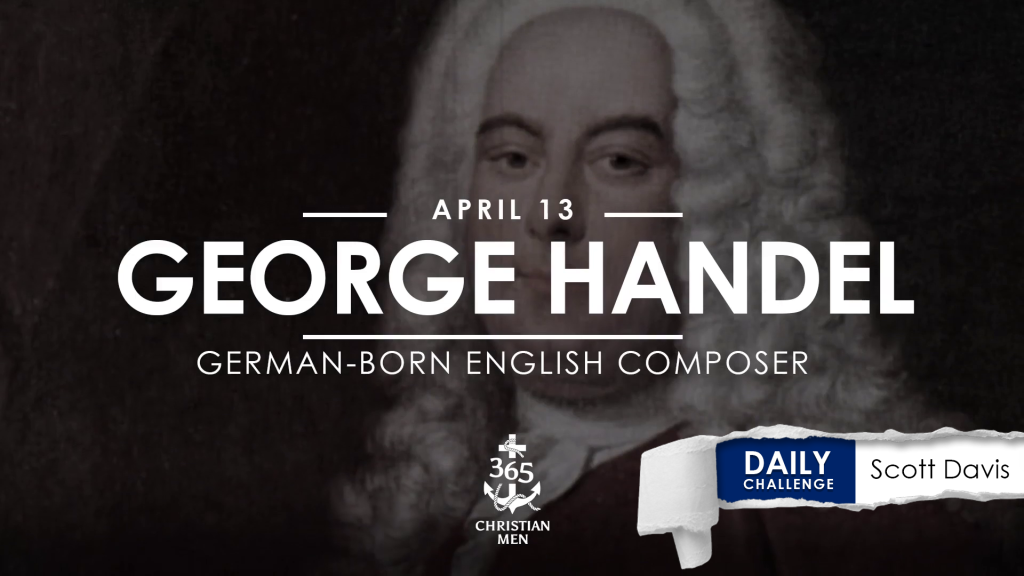April 13. George Frideric Handel. Handel wrote operas, large-scale choral works, church music, and oratorios—large-scale musical works for orchestra and voices often with religious theme.
But George’s passion and talent couldn’t be denied. By the time he was 10, he had mastered composing for the organ, oboe, and violin. He later added the harpsichord.
George became an international figure, famous in Italy, Germany, and England. He experienced bankruptcy, suffered two mild strokes, regained both health and fortune, and helped establish what is now the Royal Society of Musicians. In 1750, he lost sight in his left eye. In 1752, he lost sight in his right eye. But blindness couldn’t stop him, and he continued to compose until he died in 1759.
On this date in 1742, his greatest oratorio Messiah debuted in Dublin.
With a vision from God, endure the critics. The vision’s time will come.
You’d think a man of genius like George Frederic Handel would have it all. But it wasn’t success that set the backdrop for Handel’s Messiah, one of the most powerful musical compositions in history.
When Handel was 56, he wondered if he’d just given his last concert. Life’s circumstances overwhelmed him. Like many of us do when things get tough, Handel considered giving up.
In the spring of 1741 debtor’s prison loomed before Handel. Four years before, overwork and anxiety brought on an attack of paralysis, and the resulting bankruptcy nearly destroyed him. While his work had since gained some acclaim, he was at odds with the Church of England. Debt, depression, and the compulsion to eat, not compose, filled his days.
What had gone wrong? Too much entrepreneurial spirit? Mixing his love for Bible stories with his love for theater? Much of his demise stemmed from the censure of the religious elite.
When he’d released the oratorio Esther, the religious leaders were furious, and they declared Scripture belonged in the church, not the theater. When Israel in Egypt released, they ripped down concert fliers and disrupted performances.
Handel pushed against their attempts to silence him. Setting Scripture to music and sharing it with the masses brought him joy. A good Lutheran, he read Scripture for himself and was at peace. The church need not define his choices.
But passion-of-purpose didn’t pay the bills. And for Handel, depression had become the norm.
Then one day a wealthy friend Charles Jennings came to visit with an interesting proposal—a libretto he’d taken directly from Scripture in an effort to establish the deity of Christ. Would Handel compose the music?
He would. When he was later promised a generous commission to compose for a charity benefit, he set to work. Once again Handel would put Scripture to music for performance in a public venue.
For nearly three weeks Handel didn’t leave his London home. He composed at a feverish pace, emotional, often leaving his food untouched.
After he finished the Hallelujah Chorus, tears streamed down his face. “I did think I did see all Heaven before me and the great God Himself,” he said. On page 259 of Messiah, the last of a work with an estimated quarter of a million notes, Handel penned “SDG” or Soli Deo Gloria—To God Alone the Glory.
Later he quoted the Apostle Paul, “Whether I was in the body or out of my body when I wrote it I know not.”
Handel’s Messiah debuted in Dublin. Men left their swords at home, and women didn’t wear hoops under their skirts, so an additional 100 people could squeeze into Fishamble Street Musick Hall. The overcapacity crowd of 700 wasn’t disappointed.
The Dublin Journal said Messiah, “conspired to transport and charm the ravished Heart and Ear.” The concert raised more than 400 pounds, which was used to free 142 men from debtor’s prison.
While it took a while for the religious of London to fully embrace Messiah, eventually it became a mainstay during the Christmas season. Handel grew wealthy and successful—and often alleviated the suffering of others through generous donations.
In 1759 Handel gave his last performance to a thunderous ovation. As the people cheered, Handel cried out, “Not from me … but from Heaven … comes all.”
“I have told you all this so that you may have peace in me. Here on earth you will have many trials and sorrows. But take heart, because I have overcome the world,” (John 16: 33, NLT).
Has God given you a vision of something to accomplish? With a vision from God, endure the critics. The vision’s time will come.
Biography.com Editors. “George Frideric Handel Biography.” The Biography.com website. A&E Television Networks. Updated June 16, 2020. Accessed August 1, 2020. https://www.biography.com/musician/george-handel.
Cudworth, Charles. “George Frideric Handel: German-English Composer.” Encyclopedia Britannica. Britannica.com. Accessed August 1, 2020. https://www.britannica.com/biography/George-Frideric-Handel/Music.
Spiritual lives of the Great Composers, Patrick Kavanaugh, 1992,1996, Zondervan Publishing House, Grand Rapids Michigan.
https://www.npr.org/templates/story/story.php?storyId=880893
Story read by Nathan Walker





